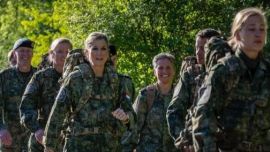Former combatants for Colombia's once-largest rebel army asked for forgiveness Monday as they acknowledged kidnappings during the nation's long civil conflict at a special tribunal created by the peace process.
Eleven former rebels gave the Special Peace Jurisdiction three file folders offering the first joint, written testimony outlining the guerrilla army's responsibility in kidnappings of politicians, soldiers and civilians.
"We are reflecting deeply over the acts of war so that we can ask for forgiveness for the errors committed," said Rodrigo Londoño, alias 'Timochenko,' the guerrilla army's former leader who is now spearheading their nascent political party.
The testimony comes as cracks in Colombia's still-fragile peace process continue to emerge. A small cadre of ex-rebel commanders officially abandoned the historic accord recently and announced they are rearming. Vast stretches of remote, rural land remain in the control of illegal armed groups fighting over drug routes. Meanwhile, many former combatants transitioning to civilian life have turned up dead.
Complete account
Londoño showed up at the Special Peace Tribunal in Bogotá carrying a car seat for his infant son and promising magistrates that despite the obstacles, most ex-rebels are committed to providing a complete account of war crimes.
"After decades of fratricidal violence, no-one can say there was a winner," he said, reading a statement before the tribunal. "To the contrary, entire generations were condemned to all types of humiliating violence. All of us lost."
The tribunal is tasked with investigating, judging and handing out sentences for the most serious war crimes. Thus far, it has opened a half dozen cases against leftist guerrillas and military officers. Most of the 9,700 ex-rebels who have vowed to cooperate will avoid any jail time by providing a full confession.
The first case concerns kidnappings that Revolutionary Armed Forces of Colombia (FARC) rebels committed between 1993 and 2012, a time when the rebel army was expanding.
Kidnappings were a common practice used to extort money from families and show control over the civilian population. Victims included high-profile politicians like Ingrid Betancourt, who was abducted while campaigning for president.
Some kidnapping victims were rescued while others were killed or remain missing.
Londoño described the abductions as an "unfortunate practice" the rebel army tried to keep at a minimum. But as time stretched on, the guerrillas grew increasingly weakened by military bombings and arrests. He said the "dynamics of war" compelled them to target civilians who could advance the rebels' political and economic goals.
"We're not looking to justify any conduct that violates international humanitarian law, but to let it be known in our own words the objective reasons that led many Colombians to form what was the FARC," he said, referring to the group's Spanish acronym.
Londoño added that the testimony provided Monday came after many months of meetings, interviews and questioning at demobilisation zones scattered around the country. The written account does not provide details on individual cases. However, he said ex-rebels expect to offer a more detailed documentation on kidnappings in the months ahead.
"In the name of the men and women who formed our organization, we assume collective, ethical, and political responsibility for the harm done," he said.
Five-decade conflict
The 2016 peace accord ending Latin America's longest-running conflict calls for a three-pronged approach to documenting a conflict so immense that a full reckoning of all crimes committed is virtually impossible.
The five-decade conflict between leftist rebels, paramilitaries and the state left at least 250,000 dead, 80,000 missing and millions displaced.
An independent truth commission is investigating why the conflict happened, what atrocities were committed and how future bloodshed can be avoided. A unit for the disappeared is gathering information on those whose remains have still not been found or identified. The Special Peace Tribunal, perhaps the most contentious part of the accord, will levy largely symbolic sanctions aimed at making reparations.
Though similar to other peace processes around the world, many Colombians with still-fresh memories of the conflict consider the terms far too generous and would prefer to see the former rebel commanders behind bars.
Monica Cifuentes, a representative of the inspector general's office, called on former rebels to share information on 522 missing people, including details on which guerrillas were involved and how, and when and where the kidnapping happened.
"The moment has arrived to offer those clarifications, explanations," Cifuentes said, sitting before a row of ex-rebel leaders dressed in pale-coloured dress shirts and sports jackets in a large room at the Peace Tribunal's offices. "To shed light on those events, for the good of the victims and the reestablishment of their rights, and for the good of Colombian society."
Magistrates will review the rebels' written testimony and compare it to accounts provided by the state and victims' organisations.
Whether Colombia's peace process is deemed credible in the eyes of victims and skeptical citizens will hinge largely on whether the ex-combatants can provide a detailed account of their war crimes, political analyst Leon Valencia said.
"Without a doubt, the crime they were most accused of and which had the most resonance in the media was kidnapping," he said. "They need to explain if these people are alive or dead and how they were killed. It's a huge task."
– AP
by Christine Armario and César García



















Comments